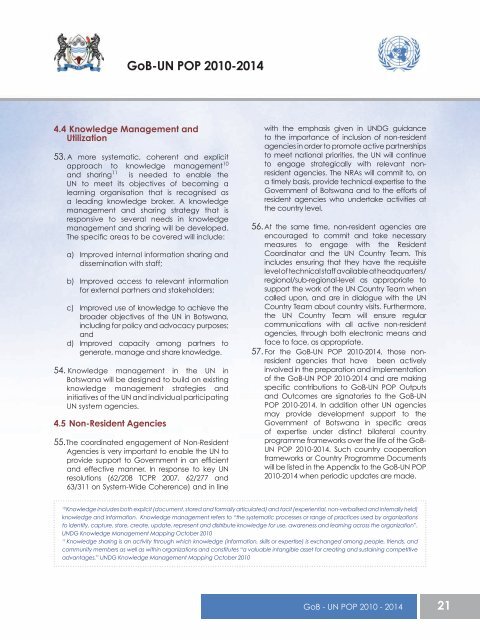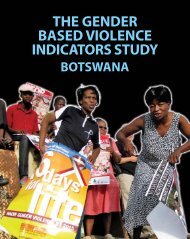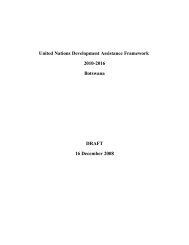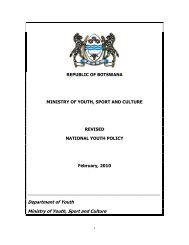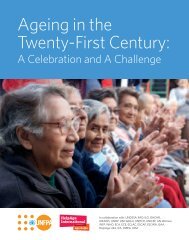GoB-UN POP 2010-2014 - UNFPA Botswana
GoB-UN POP 2010-2014 - UNFPA Botswana
GoB-UN POP 2010-2014 - UNFPA Botswana
- No tags were found...
Create successful ePaper yourself
Turn your PDF publications into a flip-book with our unique Google optimized e-Paper software.
<strong>GoB</strong>-<strong>UN</strong> <strong>POP</strong> <strong>2010</strong>-<strong>2014</strong>4.4 Knowledge Management andUtilization53. A more systematic, coherent and explicitapproach to knowledge management 10and sharing 11 is needed to enable the<strong>UN</strong> to meet its objectives of becoming alearning organisation that is recognised asa leading knowledge broker. A knowledgemanagement and sharing strategy that isresponsive to several needs in knowledgemanagement and sharing will be developed.The specific areas to be covered will include:a) Improved internal information sharing anddissemination with staff;b) Improved access to relevant informationfor external partners and stakeholders;c) Improved use of knowledge to achieve thebroader objectives of the <strong>UN</strong> in <strong>Botswana</strong>,including for policy and advocacy purposes;andd) Improved capacity among partners togenerate, manage and share knowledge.54. Knowledge management in the <strong>UN</strong> in<strong>Botswana</strong> will be designed to build on existingknowledge management strategies andinitiatives of the <strong>UN</strong> and individual participating<strong>UN</strong> system agencies.4.5 Non-Resident Agencies55. The coordinated engagement of Non-ResidentAgencies is very important to enable the <strong>UN</strong> toprovide support to Government in an efficientand effective manner. In response to key <strong>UN</strong>resolutions (62/208 TCPR 2007, 62/277 and63/311 on System-Wide Coherence) and in linewith the emphasis given in <strong>UN</strong>DG guidanceto the importance of inclusion of non-residentagencies in order to promote active partnershipsto meet national priorities, the <strong>UN</strong> will continueto engage strategically with relevant nonresidentagencies. The NRAs will commit to, ona timely basis, provide technical expertise to theGovernment of <strong>Botswana</strong> and to the efforts ofresident agencies who undertake activities atthe country level.56. At the same time, non-resident agencies areencouraged to commit and take necessarymeasures to engage with the ResidentCoordinator and the <strong>UN</strong> Country Team. Thisincludes ensuring that they have the requisitelevel of technical staff available at headquarters/regional/sub-regional-level as appropriate tosupport the work of the <strong>UN</strong> Country Team whencalled upon, and are in dialogue with the <strong>UN</strong>Country Team about country visits. Furthermore,the <strong>UN</strong> Country Team will ensure regularcommunications with all active non-residentagencies, through both electronic means andface to face, as appropriate.57. For the <strong>GoB</strong>-<strong>UN</strong> <strong>POP</strong> <strong>2010</strong>-<strong>2014</strong>, those nonresidentagencies that have been activelyinvolved in the preparation and implementationof the <strong>GoB</strong>-<strong>UN</strong> <strong>POP</strong> <strong>2010</strong>-<strong>2014</strong> and are makingspecific contributions to <strong>GoB</strong>-<strong>UN</strong> <strong>POP</strong> Outputsand Outcomes are signatories to the <strong>GoB</strong>-<strong>UN</strong><strong>POP</strong> <strong>2010</strong>-<strong>2014</strong>. In addition other <strong>UN</strong> agenciesmay provide development support to theGovernment of <strong>Botswana</strong> in specific areasof expertise under distinct bilateral countryprogramme frameworks over the life of the <strong>GoB</strong>-<strong>UN</strong> <strong>POP</strong> <strong>2010</strong>-<strong>2014</strong>. Such country cooperationframeworks or Country Programme Documentswill be listed in the Appendix to the <strong>GoB</strong>-<strong>UN</strong> <strong>POP</strong><strong>2010</strong>-<strong>2014</strong> when periodic updates are made.10Knowledge includes both explicit (document, stored and formally articulated) and tacit (experiential, non-verbalised and internally held)knowledge and information. Knowledge management refers to “the systematic processes or range of practices used by organizationsto identify, capture, store, create, update, represent and distribute knowledge for use, awareness and learning across the organization”.<strong>UN</strong>DG Knowledge Management Mapping October <strong>2010</strong>11Knowledge sharing is an activity through which knowledge (information, skills or expertise) is exchanged among people, friends, andcommunity members as well as within organizations and constitutes “a valuable intangible asset for creating and sustaining competitiveadvantages.” <strong>UN</strong>DG Knowledge Management Mapping October <strong>2010</strong><strong>GoB</strong> - <strong>UN</strong> <strong>POP</strong> <strong>2010</strong> - <strong>2014</strong> 21


